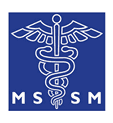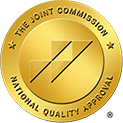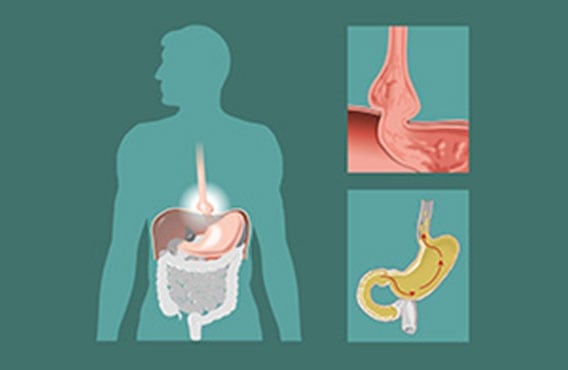
Find out how you could benefit from Hiatal Hernia Repair.
A hiatal hernia happens when part of a patient’s stomach gets pushed through the diaphragm and up through the sphincter to the esophagus. Normally, the diaphragm muscle acts to keep the stomach down so that the food and stomach acids do not move upward and cause pain or damage to the esophagus.
- In most cases, the amount of stomach tissue that moves out of place is small
- Most people with a hiatal hernia will not even know that they have this condition
Some patients will develop symptoms that are problematic enough that they need the care of a physician for a hiatal hernia repair. Medical treatment of a hiatal hernia corrects the displacement of the stomach and typically relieves the symptoms that are experienced by the patient.
To learn more about repairing a hiatal hernia, contact our office today to schedule a consultation.
Symptoms of a Hiatal Hernia
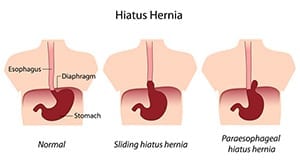 A small to medium sized hiatal hernia is unlikely to cause noticeable symptoms in a patient, and many patients are not even aware that they have a hernia. When a person develops a large hiatal hernia, or if a small one grows in size, he or she may begin to notice symptoms such as heartburn–even after small or bland meals. The person may burp more than usual, even after only eating or drinking a small amount of food or beverage. A person with a large hiatal hernia may feel full even before they have finished a small meal or snack. As the condition persists or worsens, increasing symptoms such as abdominal or chest pains can develop. These pains are most common just after eating.
A small to medium sized hiatal hernia is unlikely to cause noticeable symptoms in a patient, and many patients are not even aware that they have a hernia. When a person develops a large hiatal hernia, or if a small one grows in size, he or she may begin to notice symptoms such as heartburn–even after small or bland meals. The person may burp more than usual, even after only eating or drinking a small amount of food or beverage. A person with a large hiatal hernia may feel full even before they have finished a small meal or snack. As the condition persists or worsens, increasing symptoms such as abdominal or chest pains can develop. These pains are most common just after eating.
Vomiting of blood or passing of black stools is an indication that a large hiatal hernia has become severe and there may be bleeding of the stomach or esophagus. Patients with these more severe symptoms should be promptly seen and treated for the condition. If you notice any of these serious side effects, seek medical care immediately.
Causes of Hiatal Hernia
 A hiatal hernia is caused by weakening of the diaphragm or upward pressure on the stomach. This results in a bulge of stomach tissue getting pushed out of its proper place in the abdomen. Some of the causes of this type of muscle weakening could include an injury to the stomach or abdomen, such as an automobile accident or getting punched or kicked in the stomach. A violent jolt, such as rapid movements on an amusement park ride, could also cause this problem.
A hiatal hernia is caused by weakening of the diaphragm or upward pressure on the stomach. This results in a bulge of stomach tissue getting pushed out of its proper place in the abdomen. Some of the causes of this type of muscle weakening could include an injury to the stomach or abdomen, such as an automobile accident or getting punched or kicked in the stomach. A violent jolt, such as rapid movements on an amusement park ride, could also cause this problem.
Other possible causes of the muscle weakening that promotes a hiatal hernia to develop include being born with a large hiatus, persistent coughing, straining during bowel movements, repeated vomiting, or improper technique when lifting heavy objects. People at a higher risk of developing a hiatal hernia include anyone who is over the age of 50 and patients who are obese.
Having an eating disorder or a gastrointestinal problem such as Crohn’s disease may also increase the risk of developing a hiatal hernia. Your doctor can help you attempt to identify what could have caused your hernia to develop.
How a Hiatal Hernia Is Diagnosed
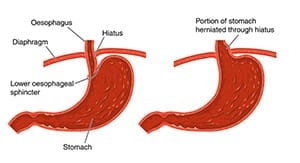 In most cases, a patient with a hiatal hernia may first be diagnosed by an internal medicine or family practitioner. If the problem persists or worsens or of a person has severe symptoms, a specialist might be recommended. Before an appointment for hiatal hernia diagnosis, a person may be asked to refrain from eating or drinking. This is because certain diagnostic medications may need to be given, and eating or drinking could interfere with the effectiveness and accuracy of the diagnosis. The doctor will ask questions such as whether the pain or symptoms get worse after eating or drinking certain types of foods or if the symptoms are worse at a certain time of the day.
In most cases, a patient with a hiatal hernia may first be diagnosed by an internal medicine or family practitioner. If the problem persists or worsens or of a person has severe symptoms, a specialist might be recommended. Before an appointment for hiatal hernia diagnosis, a person may be asked to refrain from eating or drinking. This is because certain diagnostic medications may need to be given, and eating or drinking could interfere with the effectiveness and accuracy of the diagnosis. The doctor will ask questions such as whether the pain or symptoms get worse after eating or drinking certain types of foods or if the symptoms are worse at a certain time of the day.
The physician may also inquire about the patient’s medical history, such as the amount of alcohol, tobacco, and caffeine that is consumed, how much exercise the patient performs, and what type of work and leisure activities are done by the patient. Understanding your current health and medical history helps the doctor to make decisions about your care.
Most physicians will order tests for the patient. These diagnostic tests include blood tests to check for anemia, an esophogram to check for the placement of the internal organs, and an endoscopy so that the doctor can get a good visual of what is going on inside of the patient’s digestive system. Some patients may need a manometry test, which involves passing a thin, flexible tube through the nose, down the esophagus, and into the stomach to monitor pressure levels.
Treatment Options for Hiatal Hernia
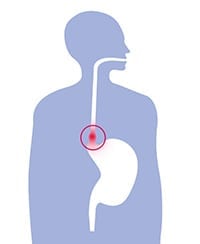 Physicians usually begin hiatal hernia repair with conservative treatments like medications. Patients may be given medicines to reduce or block the production of stomach acid. These medicines also help to heal the esophagus. In severe hiatal hernia situations, surgical repair may be needed. This is reserved for emergencies. The surgery involves making a single incision into the abdomen. The doctor will correct the problem by tightening the esophageal sphincter, reconstructing the sphincter or making the opening in the diaphragm smaller. The physician may also remove the hernia sac.
Physicians usually begin hiatal hernia repair with conservative treatments like medications. Patients may be given medicines to reduce or block the production of stomach acid. These medicines also help to heal the esophagus. In severe hiatal hernia situations, surgical repair may be needed. This is reserved for emergencies. The surgery involves making a single incision into the abdomen. The doctor will correct the problem by tightening the esophageal sphincter, reconstructing the sphincter or making the opening in the diaphragm smaller. The physician may also remove the hernia sac.
After surgery, patients can expect a recovery time of about 4 weeks, during which they should rest and limit their physical activities so that their bodies can fully heal and the muscles recover. If you need surgery to repair a hiatal hernia, your doctor will provide you with the instructions you need to make sure that your recovery goes smoothly. It is very important to follow these instructions carefully so that there are no complications and so that you can get back to your regular activities as quickly as possible.
To learn more about the procedures that we perform, including hiatal hernia repair, contact our office today. We provide consultations for our patients and boast a top surgical medical team specializing in weight loss procedures, hernia repair, and more.


